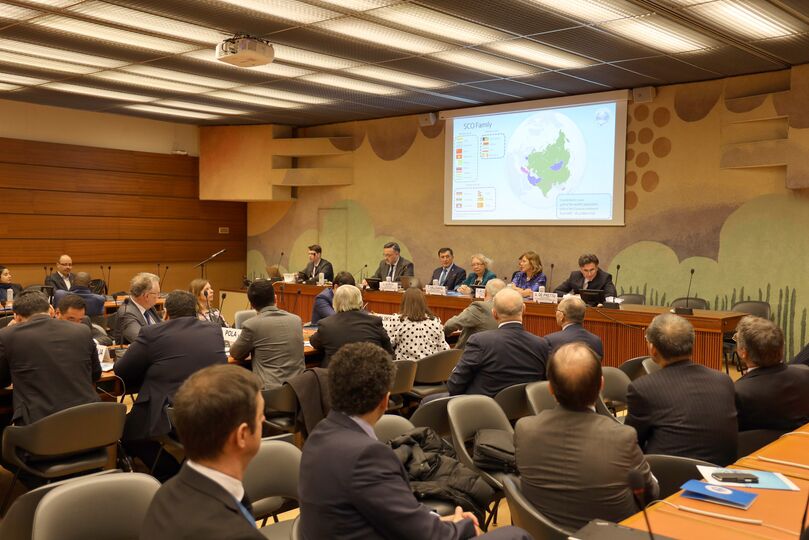On 27 February 2020, the SCO Secretariat and the UN Economic Commission for Europe (UNECE) held a High-Level Round Table on the implementation of the 2030 Agenda for Sustainable Development along the trans-continental Eurasian Transport Corridors during the annual session of the UNECE Inland Transport Committee (ITC).
The event was attended by representatives of SCO member states, observer countries and dialogue partners, as well as UN member states. Reports were delivered by SCO Secretary-General Vladimir Norov, Director-General of the United Nations at Geneva Tatiana Valovaya, UNECE Executive Secretary Olga Algayerova and Secretary General of the International Road Transport Union (IRU) Umberto de Pretto.
Vladimir Norov pointed out that the main SCO principles are openness, non-direction against other states and international organisations and non-alignment with any bloc. The SCO member states stand for building a fair and more balanced world order based on equal, common, indivisible, comprehensive and sustainable security, for improving the architecture of global economic management and developing cooperation in the fields of trade, the economy and investment, as well as for consistently strengthening an inclusive, transparent and non-discriminatory multilateral system of trade based on the recommendations of the World Trade Organisation.
The strengthening of economic ties within the SCO is based on the implementation of the Programme of Multilateral Trade and Economic Cooperation of SCO Member States until 2035 and the Agreement on Facilitation of International Road Transport. These documents stipulate the modernisation of the existing and the creation of new transport corridors, the use of digital technology and intelligent transportation systems, the construction of multimodal logistic centres, as well as the removal of obstacles to the free movement of goods.
The SCO Secretary-General noted that the organisation was an excellent platform for aligning national development strategies and regional integration initiatives, such as the Eurasian Economic Union (EAEU), the Belt and Road Initiative, the Central Asian economic development strategy and the International North-South Transport Corridor connecting Russia, India and Iran. The SCO can also contribute to the implementation of the Greater Eurasian Partnership as a broad integration organisation based on a network of regional associations and transcontinental projects.
Vladimir Norov emphasised that closer cooperation in the field of transport, primarily roads and railways, was crucial for the landlocked Central Asian countries, which constitute the core of the Shanghai Cooperation Organisation. It is also important to involve Afghanistan as an observer country within the framework of the Road Map for Further Action by the SCO-Afghanistan Contact Group,
which was adopted at the SCO summit held in Bishkek in 2019. In particular, the construction of the railway route between Hairatan and Mazar-i-Sharif and the planned railway tracks to connect Mazar-i-Sharif with Herat and Peshawar will constitute a new transit corridor and access to Iranian, Pakistani and Indian railway lines as well as the ports of Chabahar and Gwadar.
The SCO Secretary-General suggested holding a special gathering where experts representing various regional organisations would discuss the creation of a ramified integration system of Eurasian transport routes.
Tatiana Valovaya, Olga Algayerova and Umberto de Pretto spoke about the transport targets of the UN Sustainable Development Goals.
Director-General of the United Nations at Geneva Tatiana Valovaya pointed out that the UN and the SCO, if they joined efforts, could promote regional cooperation at all levels and make a positive contribution to life in general in Eurasia.
UNECE Executive Secretary Olga Algayerova noted that the joint event underscored the common aspirations of the two organisations in the sphere of transcontinental transport corridors.
IRU Secretary General Umberto de Pretto emphasised that SCO member states, being IRU members, were actively involved in the creation of a common road transport infrastructure in Eurasia. He said that he hoped that the synergy of SCO documents and IRU conventions would facilitate the achievement of the transport targets of the UN Sustainable Development Goals.
A meaningful and constructive exchange of views was held at the event on the negative effects of environmental pollution, the liberalisation of customs tariffs as well as the strengthening of the transport potential of SCO and UNECE countries.
